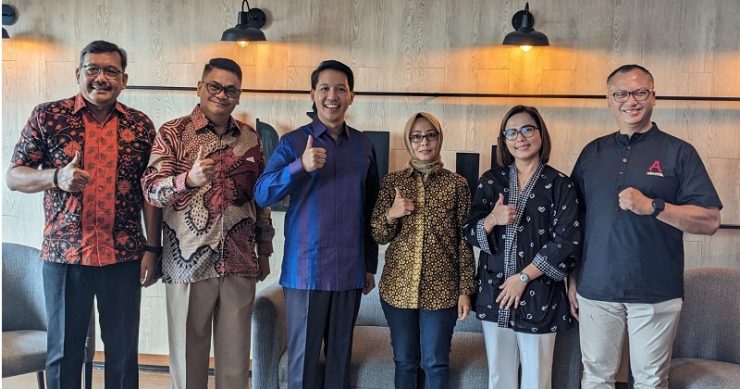GELORA Bung Karno (GBK), the oldest and largest sports ground in Indonesia, is often used for major events, from sports matches to music concerts. One of the inspirational figures behind the dashing Gelora Bung Karno is Rakhmadi Afif Kusumo. Rakhmadi, affectionately known as Adi, was appointed GBK’s Chief Director on January 6, 2021. He was appointed directly by the Minister of State Secretary.
While speaking at the Intimate Media Luncheon of Jakarta’s Media Association (HAM) with the theme “Strengthening GBK as a Leading Sports and Entertainment Tourism Destination in the World” at Agni Lounge, ARTOTEL Gelora Senayan Jakarta (07/18), with his position, Adi has big dreams to make GBK a regional center for sports culture, entertainment, education and international business. In the midst of the pandemic that has hit Indonesia since early 2020, he continues to innovate in order to provide the best service to the community.
“It is known that during the pandemic in 2021, Gelora Bung Karno (GBK) played a role in the national economic recovery efforts (PEN) and made Indonesian society healthier. Several things held by GBK include supporting the central government program by making venues at GBK National Vaccination Centers,” he said.
Adi sees GBK as an icon of Indonesian pride. Therefore, he is trying to realize GBK’s vision and mission, especially in 2022. The vision and mission are to become a multi-functional sports area that is integrated in a modern way so that it can consistently be the pride of Indonesia and even excel in the world.
In his statement, GBK is open to use for other activities, not only sports activities, in response to the pros and cons of using GBK sports facilities, which are now widely used for non-sports activities, including concerts.
In accordance with our vision and mission to become a world leading, modern, environmentally friendly, integrated sports area. Meanwhile, its mission is to provide excellent service by optimizing Gelora Bung Karno Complex Management Center (PPKGBK) resources to support sports and non-sports activities. To develop and utilize all potentials, maintain and develop the facilities and infrastructure as a cultural heritage object (national heritage).
“If you look at the total area of 279.1 hectares with the total assets of the GBK area amounting to IDR348 trillion, of which 23.50% (65.60 hectares) is used by government buildings, 23.67% is used commercially and 147.43 ha (52.83%) is used for sports areas,” Adi noted.
He added, I realized the nature of the GBK complex, which was built for sports. However, on the other hand, our party also requires large management and maintenance costs, the source of which can be obtained by renting facilities in GBK. Therefore, I ask the public to understand the role of Gelora Bung Karno Complex Management Center (PPKGBK). This is because the PPKGBK no longer receives any budget from the State Revenue and Expenditure Budget (APBN) since it was designated as a full-fledged Public Service Agency (BLU) in 2008, so all management and maintenance needs must be borne by the PPKGBK itself.
“The estimated maintenance cost for the GBK complex is about IDR20 billion per month. We cover this cost from the GBK rental fees. We don’t charge a penny for the training needs of national training athletes recommended by the Ministry of Youth and Sports. Training athletes who defend the red and white is of course our priority, but these events at GBK also cover the maintenance costs for comfortable training at GBK,” he remarked.
However, Adi stated that the Gelora Bung Karno Complex Management Center (PPKGBK) remains committed to promoting and fully supporting the Indonesian sports development process at GBK as the first multi-sport complex in Indonesia, which was first built for the 1962 Asian Games.
Rakhmadi Afif Kusumo believes that the steps taken by PPKGBK are a business model that can ultimately benefit all parties. Because managing and maintaining the facilities at the GBK complex is not easy. The policy I have implemented cannot be avoided. I also come from a business background, and in managing a business, we are required to find solutions to achieve a win-win solution.
“My dream is to place the GBK area as a world-class sports complex and venues such as: (1). Singapore SportsHub, (2). Tokyo Dome City, (3). Zayaed Sports City (Abu Dhabi), (4). SoFi Stadium (Los Angeles), (5). Allegiant Stadium (Las Vegas), (6). The Sphere (Las Vegas), (7). Santiago Bernabau (Real Madrid), (8). Wembley Stadium (London), (9). Kai Tak Sports Park (Hong Kong), (10). Olympic Stadium (Berlin),” he elaborated.
However, when he asked about the problems with the Sultan Hotel, Rakhmadi Afif Kusumo revealed plans to implement the Sultan Hotel after winning the land dispute with PT Indobuildco. That the disputed land area of Block 15 of the GBK area, where the Sultan Hotel is currently located, will be revitalized by the GBK PPK. This will be done for the needs of international events and public open spaces.
“We are currently revitalizing the area, there are various international activities. We already have a first draft of this plan, which we have submitted to the Ministry of PUPR and the Ministry of State Secretariat (Kemensetneg). Regarding the development plan in question, including whether to make changes to the function of the Sultan Hotel and apartments. However, I emphasize that this is done for the needs of the wider community,” he pointed out.
He added, the basic spirit is how we can provide green open space, better access and support facilities for the people there. As to whether there will be hotels of any kind, this is still under discussion with the Ministry of State Secretariat.
“The Ministry of State Secretariat through Gelora Bung Karno Complex Management Center (PPKGBK) will revitalize the GBK area, including through infrastructure improvement activities, area planning, additional parking and accessibility areas, provision of support facilities, and arrangement of city forests and green open spaces,” concluded Rakhmadi Afif Kusumo. [traveltext.id]
















